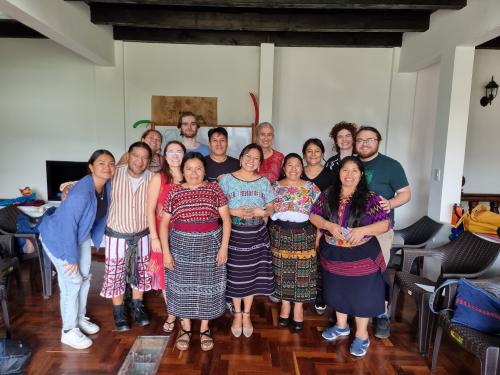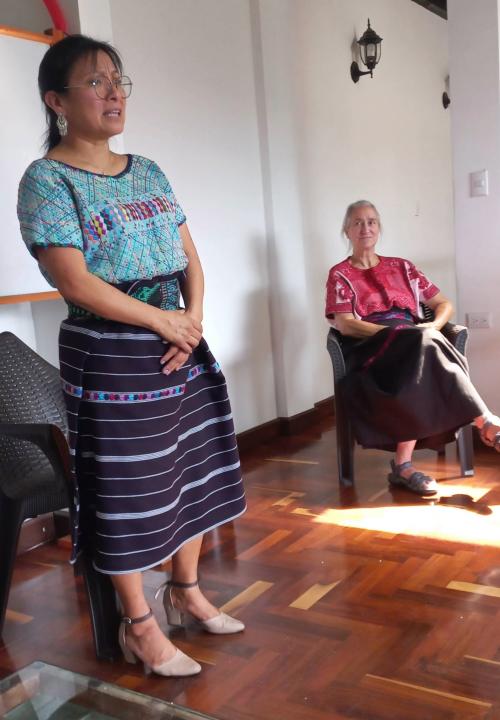Mayan Language Institute: Visit of Governor Angelina Aspuac
Written by Judith Maxwell
July 18, 2024, the Intensive Kaqchikel Language and Culture Class, Oxlajuj Aj [Mayan Language Institute], under the aegis of the Stone Center for Latin American Studies, had the honor of hosting a talk by Ms. Angelina Aspuac, the newly appointed Governor of the Departamento[1] of Sacatepéquez, Guatemala. Ms. Aspuac is the first Indigenous person to govern the Departamento since the Spanish invasion in 1524. She is also the first woman to occupy that position. She spoke to us about the challenges faced by Mayan women in the spheres of power, particularly those of politics and economics.
Guatemalan governors are chosen from a list of candidates drawn up by a council. This council for Sacatepéquez consists entirely of moneyed non-Indigenous men. Ms. Aspuac, though duly registered as a candidate, did not appear on the list these men presented to the President, Bernardo Arévalo. No Indigenous candidates and no women made the list. President Arévalo rejected the list and asked them to reconsider all those who had submitted the candidacy declaration forms with the requisite number of voter signatures. After reconsideration, the council again submitted a list devoid of Indigenous people and women. Arévalo again rejected their list and directly appointed Ms. Aspuac. The oligarchs immediately filed suit to block the appointment as unconstitutional. The appointment was upheld and now Ms. Aspuac administers a Departamento with seventeen large municipalities, each governed by a non-Indigenous male, all of whom challenged her individually and collectively in their first meetings. Slowly Ms. Aspuac is winning them over by checking in with them and asking what they need, how the Departmental government can help them, exemplifying the power of mutual aid and respect.
In 1988 Ms. Aspuac helped found the National Movement of Weavers, which grew out of Women's Association for the Development of Sacatepéquez -AFEDES-. The organization now has chapters in Departamentos throughout the Mayan highlands. Among their goals are (a) protection of the intellectual property rights of weavers, (b) teaching the art to new weavers, (c) conserving the millennial knowledge woven into the fabric designs. A central tenet is “our weavings are the books that the colonial (authorities) could not burn”.
While her appointment was a win for greater equity, Ms. Aspuac has continued to fight for respect as an indigenous woman in her prestigious role. Ms. Aspuac is currently isolated in her office. None of her staff are Indigenous. In her conversation with Oxlajuj Aj she shared that her staff do not return her greetings when she enters the office, which is one of the simplest and most fundamental signs of respect. When she goes to regional and federal meetings, many non-Indigenous leaders refuse to acknowledge her, until she is formally presented and takes the podium. Nonetheless, she persists. She brings the Mayan philosophy of respect and mutual assistance to her office, as well as the understanding that the universe and all its elements are alive, co-existing and reciprocally influencing.
Her warm welcome at Oxlajuj Aj offered a safe space for an interchange of ideas, hopes and desires.

[1] A “departamento” in Guatemala is roughly equivalent to a “state” in the US.
The Mayan Language Institute is a 6-week program to train students in either Kaqchikel or K’iche’ Maya, two of the most widely-spoken Mayan languages in Iximulew (Guatemala) today. The program is sponsored by the Stone Center for Latin American Studies at Tulane University and the Center for Latin American, Caribbean, and Latinx Studies at Vanderbilt University. Thanks to the collaboration between U.S. American faculty and Maya teachers, participants can study at the beginning, intermediate, or advanced levels of either language. The program’s highly individualized classes combine language immersion activities, lectures, one-on-one conversations, guest speakers and cultural excursions. If you are interested in learning more about the Mayan Language Institute or other Summer Programs click here.

